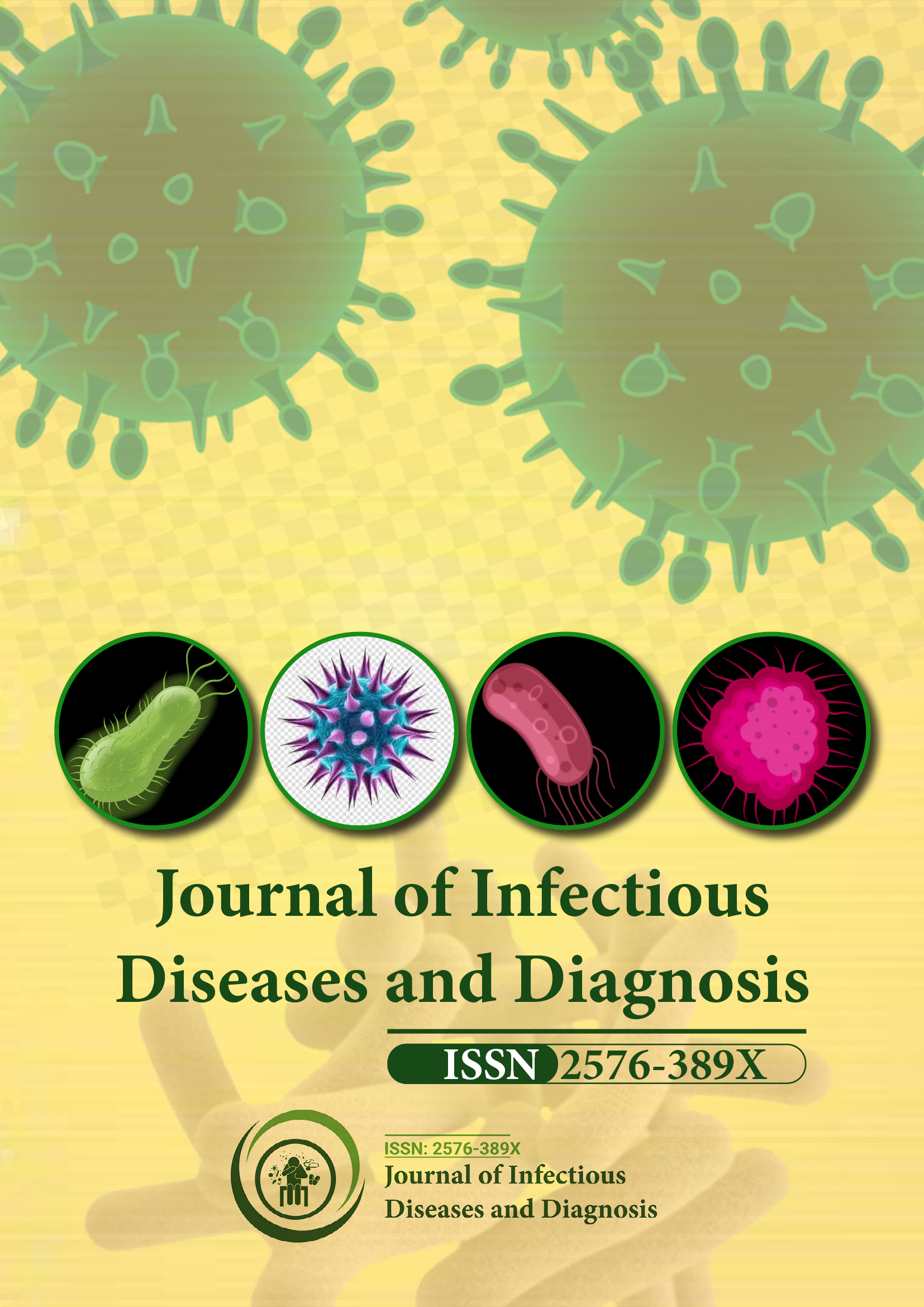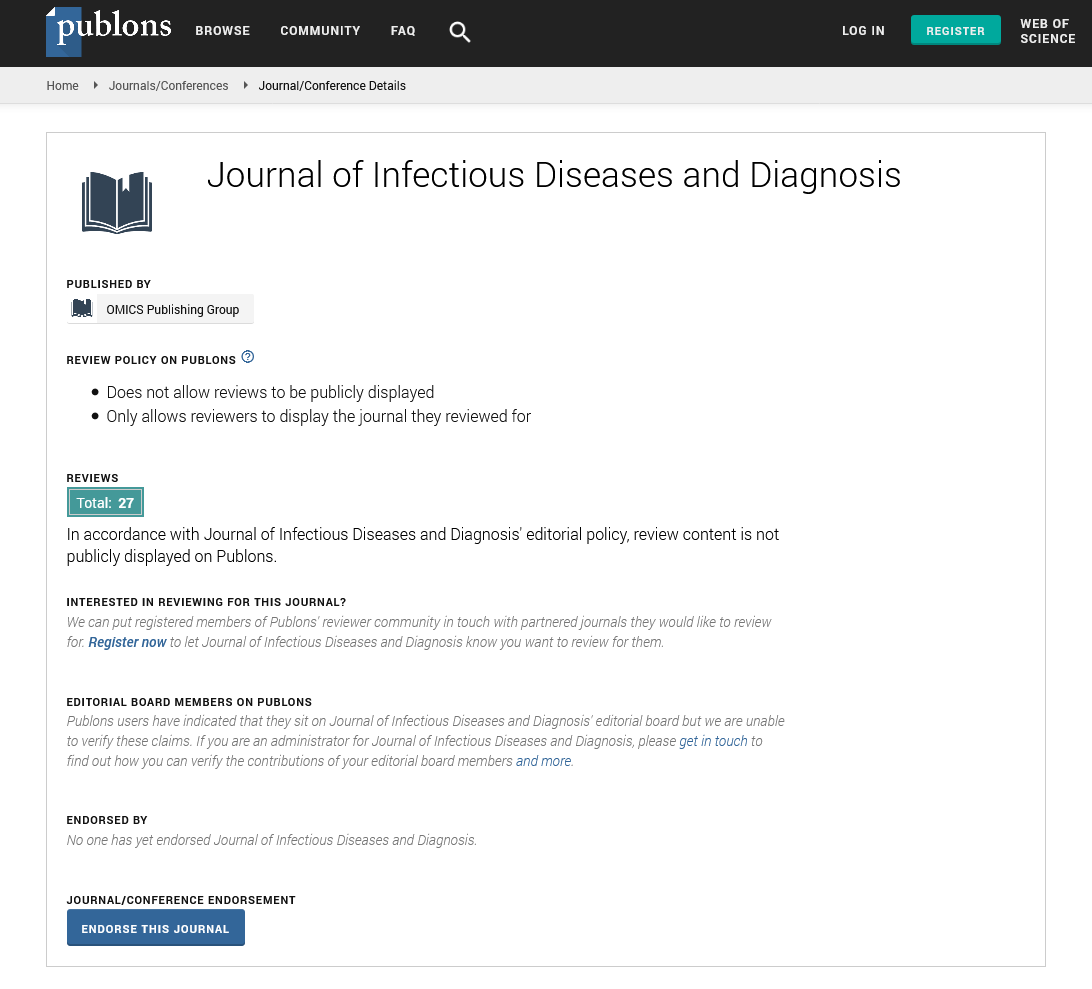Indexed In
- RefSeek
- Hamdard University
- EBSCO A-Z
- Publons
- Euro Pub
- Google Scholar
Useful Links
Share This Page
Journal Flyer

Open Access Journals
- Agri and Aquaculture
- Biochemistry
- Bioinformatics & Systems Biology
- Business & Management
- Chemistry
- Clinical Sciences
- Engineering
- Food & Nutrition
- General Science
- Genetics & Molecular Biology
- Immunology & Microbiology
- Medical Sciences
- Neuroscience & Psychology
- Nursing & Health Care
- Pharmaceutical Sciences
Commentary - (2022) Volume 7, Issue 4
Role of Antimicrobial Resistance in Infectious Diseases
Paolo Colomba*Received: 04-Jul-2022, Manuscript No. JIDD-22-17771; Editor assigned: 06-Jul-2022, Pre QC No. JIDD-22-17771 (PQ); Reviewed: 20-Jul-2022, QC No. JIDD-22-17771; Revised: 27-Jul-2022, Manuscript No. JIDD-22-17771 (R); Published: 03-Aug-2022, DOI: 10.35248/2576-389X.22.07.177
About the Study
Global antimicrobial resistance is increasing, posing a public health risk. Patients with multidrug-resistant bacteria have a higher risk of poor outcomes and death than patients with nonresistant bacteria. Multi-drug resistant bacteria are becoming more common, while new antimicrobial drugs are not being developed as quickly. Antibiotic over use and misuse in the healthcare setting has been shown to increase the spread of resistant bacteria. Antibiotic Stewardship Programs (ASPs) are initiatives that aim to reduce the use of antibiotics. Several studies have highlighted the importance of such programs in lowering the economic cost and improving the effectiveness of antibiotic use. During the last decade, the role of the Infectious Disease (ID) specialist has been constantly evolving. The ID consultant is responsible for managing the hospital's infection control as well as assisting in the diagnosis, management, and treatment of patients. The purpose of this study is to highlight the role of infectious disease specialists in providing consultations to hospitalized patients.
This short-term study demonstrates the impact of antibiotic stewardship programs and ID consultations on the reduction of inpatient antibiotic consumption. The obtained percentage of antibiotic discontinuation (14.7%) was slightly lower than that observed in other studies. The oncology department made the most requests for ID consultations, which reflects the complexity and severity of these patients' diseases. The most common sites of infection in this study's population were urinary (32%), pulmonary/Ear, Nose and Throat Infections (ENT infections) (18%), and skin and soft tissue infections (17%). The ID consult rate per admission (4.9/100 admissions) is comparable to other studies.
Multidrug resistant germs are on the rise, particularly in hospitals. Prior antimicrobial therapy, particularly with a broadspectrum agent, has been shown to increase the risk of multidrug resistant infections. A multidrug resistant infection is linked to a higher mortality rate. During a patient's hospital stay, a wide range of nosocomial infections can occur. This study demonstrates the value of infectious disease consultation in preventing these complications: 14.7% of patients had their antibiotic discontinued, 25.4% had their antibiotic modified, and carbapenem and quinolone use was reduced. The importance of infectious disease consultation in patients receiving antibiotics during their hospitalization is highlighted in this study.
It emphasizes the discontinuation of antibiotic treatment when it is not indicated, as well as the changes made to the treatment and its duration. It also demonstrates the expertise of infectious disease specialists in avoiding the use of broad-spectrum antibiotics (specially the carbapenem). Antibiotic use protocols for the most commonly encountered conditions should be implemented to reduce reliance on ID advice. The various purposes of ID consultations depicted in this study demonstrate the breadth of their work, ranging from antibiotic prophylaxis, antibiotic stewardship, diagnosis, and individual patient management. Several articles in the literature discuss the significance of the activities and roles of the ID consultants in the hospital. They play an important role in the diagnosis, optimal use of antimicrobials, and infection prevention in specific populations.
This research has some limitations: One limitation is that it was only conducted at one center, so the results may not be applicable to other settings with different consultations. It did not assess cost effectiveness or patient outcomes. This study does not investigate the impact of ID consultations on bacterial colonization in patients.
Infectious disease consultation is critical in patients receiving antibiotics during their hospitalization in order to adjust the treatment and its duration. Infectious disease specialists help to improve diagnostic and therapeutic approaches for suspected or confirmed infections. ID clinicians currently have difficult work that necessitates extensive knowledge of infectious diseases as well as frequent interaction with other subspecialists and clinicians. Infectious disease consultations helped to improve diagnostic and therapeutic approaches for hospitalized patients with suspected or confirmed infections.
Citation: Colomba P (2022) Role of Antimicrobial Resistance in Infectious Diseases. J Infect Dis Diagn. 7:177.
Copyright: © 2022 Colomba P. This is an open-access article distributed under the terms of the Creative Commons Attribution License, which permits unrestricted use, distribution, and reproduction in any medium, provided the original author and source are credited.

